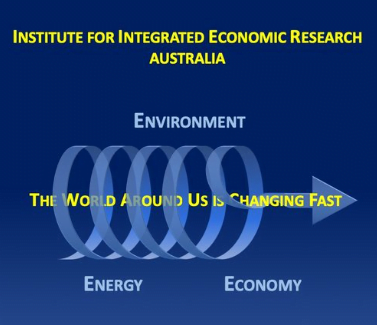By Robbin Laird
The Second Line of Defense/Defense.info team works with a number of global partners.
We welcome our latest partner The Institute for Integrated Economic Research-Australia which is chaired Air Vice Marshal (Retired) John Blackburn and was founded precisely to deal with the underlying issues which have been exposed during the recent Coronavirus crisis.
In an April 2, 2020 article by Ben Peckham published in the Australian, the work of our new partner, The Institute for Integrated Economic Research-Australia was highlighted.
Before the crisis, Scott Morrison was being urged behind the scenes to recast the national security debate to include a clear-eyed assessment of the nation’s most pressing vulnerabilities.
Australia’s overwhelming reliance on imported medicines and fuel, its decimated merchant shipping fleet and hollowed-out manufacturing industry were among the identified priorities…..
Retired air vice-marshal John Blackburn has been one of the leading advocates for a more holistic view of national security based on “smart sovereignty” and trusted supply chains.
“We’ve got to accept that the price of not doing it is much higher than the lower cost of buying the cheapest thing,” he tells The Australian.
“When a crisis happens, the government and the community can get on and manage the crisis, and we’re not running around fighting for toilet rolls.”
The Institute for Integrated Economic Research, which Blackburn chairs, recently published a paper that identifies Australia’s 90 per cent reliance on imported medicines as a national security risk. It warns that the China-dominated supply chain for drugs and active pharmaceutical ingredients leave Australia’s medical supplies vulnerable to disruption.
And the Therapeutic Goods Administration’s medicines shortages list reveals that 58 drugs used by Australians are subject to critical supply issues, with more than a dozen added to the list in the past fortnight alone.
The retired RAAF officer also has been a key agitator on Australia’s fuel insecurity, railing against the lack of strategic reserves of crude oil and finished petroleum. According to Department of Energy figures, Australia has only 29 days’ worth of liquid fuel stocks at refineries and wholesale terminals — well under the International Energy Agency’s 90-day fuel security benchmark.
According to the Institute’s website:
The Institute for Integrated Economic Research (IIER) – Australia was founded in 2018. It conducts and supports research in order to contribute to an improved understanding of how Australians can plan for, and navigate, the significant transitions in Energy, Environment and Economic Systems over forthcoming decades whilst maintaining the stability and security of our society.
These three areas are closely interlinked, but largely managed as separate competing issues, as a result of near-term political goals. We need a National Security Strategy that integrates these and other related systems, such as information and infrastructure, under a National Resilience Framework.
To address this challenge, the Institute will engage with a range of Australian think tanks, Universities, Federal and State Government department representatives, media and relevant community groups. The Institute is an independent, non-partisan, not-for-profit organisation. It will not lobby for, nor represent, any specific industry sector or business.
The IIER-Australia Board members are : Air Vice-Marshal (Retd) John Blackburn AO, Anne Borzycki, Neil Greet, Dr Hannes Kunz and Dr Gary Waters.
The Institute’s Fellows are Dr Simon Quilty, Dr Paul Barnes, Dr David Hyland-Wood, Dr Graeme Taylor, Cheryl Durrant, Bernadette Hyland-Wood, Ian McDonald AM, Dr Michael Thomas, Dr Anthony Bergin and Professor Ted Goranson.
The IIER-Australia is affiliated, but not financially / organisationally linked with the Europe based Institute for Integrated Economic Research. That Institute is a non-profit organization that is focused on identifying empirically validated macroeconomic system descriptions and models, and ensuring their dissemination.
The IIER-Australia benefits from the extensive research conducted by the IIER in Europe. IIER Europe publications and links are at the bottom of this page.
I am honored to join in their efforts as a Research Fellow as of this month.


